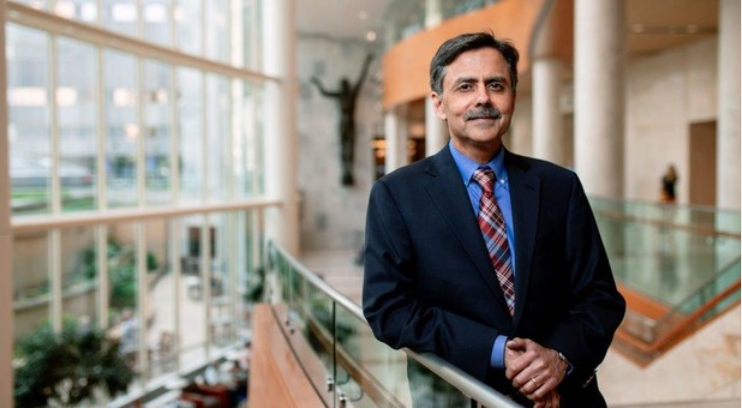Every schoolchild knows that women produce estrogen and men testosterone. So it caused quite a stir when Sundeep Khosla claimed that the female sex hormone prevents men’s bones from weakening as they age. Nevertheless, this theory turned out to be true.
“We discovered that the level of estrogen regulates both women’s and men’s bones, and then we and others succeeded in delaying people’s bone weakening with a drug that mimics estrogen action on bone. Recent research in this field has provided even more knowledge, and our latest results suggest that we can actually recreate the bone strength we have when we are young so we can entirely eliminate age-related osteoporosis,” explains Sundeep Khosla, Professor and Director, Center for Clinical and Translational Science, Mayo Clinic, Rochester, Minnesota, USA.
The Novo Nordisk Foundation is awarding Sundeep Khosla the 2018 Jacobæus Prize for his pioneering research discoveries on what happens to bones as we age. The Prize is awarded annually to a distinguished international researcher, who is invited to give a lecture on his or her research on a topic within physiology or endocrinology.
Many other factors than estrogen levels change and influence our bones as we get older. As a result, Sundeep Khosla and his colleagues decided to examine the entire well-balanced signalling system regulating the formation and resorption of bone. Over time, this balance slowly becomes skewed from damage to DNA or molecular changes that can be caused by the stress to which our cells are subjected throughout life.
“Cellular ageing is a general process that affects most cells in our body as we age. This process can result from the natural accumulation of genetic changes or the tiny chemical – epigenetic – markers on our DNA that the environment can cause. The ageing of bone cells is often caused by small changes in cellular communication: for example, in the expression of such localized chemical factors as transforming growth factor-beta,” says Sundeep Khosla.
New perspective
Sundeep Khosla’s longstanding work on ageing bones gained a new perspective and new energy with the 2008 opening of the Robert and Arlene Kogod Center on Aging at the Mayo Clinic in Rochester, Minnesota. This sparked research into how ageing influences the heart and metabolism and not merely bones. The perspectives are enormous, since the researchers hope to be able to regulate some of the fundamental mechanisms related to ageing and thereby delay and treat not only such diseases as osteoporosis and heart disease but also obesity and diabetes.
“All these diseases share the same underlying cause of increased risk – ageing. Our latest results show that medicine can influence signalling and thereby slow the development of some age-related chronic diseases. So far, we have shown that the medicine works on mice, but we are already conducting the first proof-of-concept studies involving people. We hope to market the first products within a few years that can help improve people’s quality of life as they age and also save healthcare systems billions in treating these age-related chronic diseases,” says Sundeep Khosla.
Laszlo Hegedüs, a member of the Committee on Endocrinology and Metabolism of the Novo Nordisk Foundation, which awards the Prize, says: “Sundeep Khosla is receiving the Jacobæus Prize in recognition of his enormous contribution to the field of skeletal biology and for being an outstanding representative of clinician-scientists with the rare ability of combining basic research with clinical translation, a role model needed for making genuine progress in clinical medicine.”
Sundeep Khosla says: “I am truly honoured to receive the Jacobæus Prize. Looking at the list of previous recipients of this award, I recognize the elite company I am in. This recognition of my work gives me renewed energy to continue my studies on the ageing biology of the skeleton with the now short- to intermediate-term goal of translating these findings into new treatments for osteoporosis and other age-related diseases.”
Sundeep Khosla will give his award lecture on 23 August in Odense, Denmark.
About Sundeep Khosla
Director, Center for Clinical and Translational Science, Mayo Clinic, 2013–present
Recipient, William F. Neuman Award for Outstanding Scientific Contributions, American Society for Bone and Mineral Research, 2012
President, American Society for Bone and Mineral Research, 2010–2011
Recipient, Dr. Francis Chucker and Nathan Landow Research Professorship and Mayo Foundation Distinguished Investigator, 2009
About the Jacobæus Prize
The purpose of the Jacobæus Prize is to promote medical research. The Prize is awarded annually to a distinguished international researcher, who is invited to give a lecture on his or her research on a topic within physiology or endocrinology. The lectures are held mainly at Scandinavian universities or university hospitals or in other European cities and towns connected with medical research.
The accompanying award of DKK 1,500,000 (€200,000) is distributed as a personal award of DKK 250,000 and an award for research or development work of DKK 1,250,000. The Prize is awarded with the help of the Committee on Endocrinology and Metabolism of the Novo Nordisk Foundation.
The Jacobæus Prize was established in 1939 to commemorate Hans Christian Jacobæus, a Swedish professor and pioneering clinical researcher who developed a method for exploring the pleural cavity (thoracoscopy) using a cystoscope, which greatly improved the diagnosis and treatment of lung diseases, especially tuberculosis.
Further information
Christian Mostrup Scheel, Senior Press Officer, phone: +45 3067 4805, [email protected]








